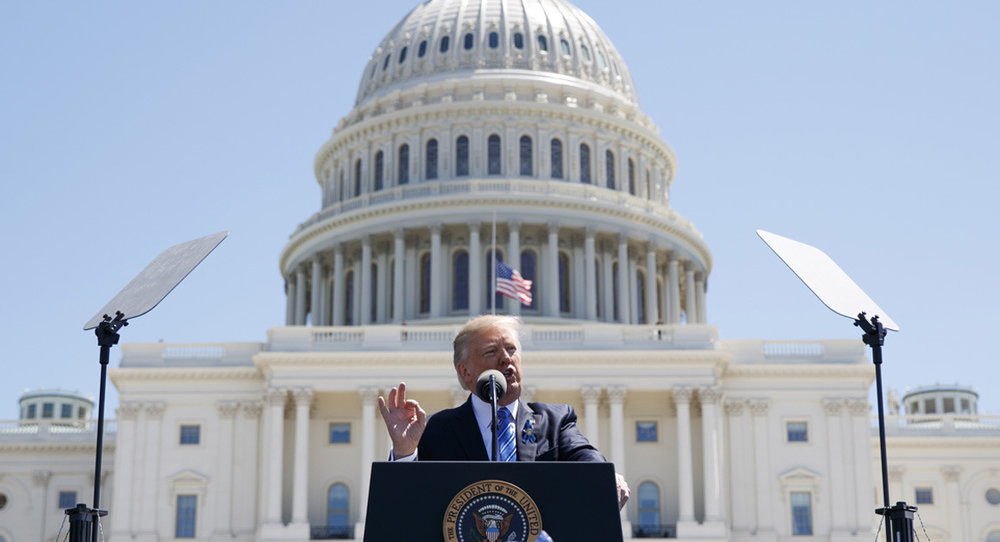New security pressures on the White House

TEHRAN _ Investigations on Russia's involvement in the 2016 presidential election in the United States continue. Trump government officials believe that the investigation is going to strike at the current U.S. government and that U.S. security officials have no other goal. However, in the coming months, it seems that a new controversy in the American political and security environment will be created by raising issues in this regard. It is noteworthy that U.S. security agencies took advantage of Trump in the 2016 US presidential election campaign, and provided maneuvering over controversy over Hillary Clinton's controversial emails to defeat democrats in the election.
What is certain is that the opponents of Trump inside the United States are trying to use the leverage of his cooperation with Russia in the 2016 presidential election. But there are some important questions that remain unanswered. Why do American officials avoid opening up other cases, such as the FBI's apparent involvement in last year's presidential elections? Why do not even the leaders of the Democratic Party, who are the victim of this intervention, talk about this? It's not clear what happened in U.S. security equations! However, it is clear that in the near future, we will witness new security conflicts in the U.S. political climate. An issue that can also affect the United States' internal and social equations.
U.S. officials continue to accuse Russia of interfering in the 2016 presidential election. This is while US President Donald Trump has explicitly denied accusations of engagement with Russian officials. On the other hand, the FBI, which is currently pursuing a case of Russian involvement in the U.S. presidential election, is accused of interfering in elections. Everyone remembers that during the last year's presidential race in the United States, while remaining only 24 hours before the election, the FBI leader, redefining Democrats' Hillary Clinton emails, led to her defeat In the election and change the votes of some voters became profitable for the Trump. However, Russia's involvement in the U.S. presidential election seems to be open to U.S. officials. An overview of the news and reports published in this regard can be remarkable.
What is certain is that there are many questions about the U.S. presidential election and the implications of the involvement of U.S. security agencies in this regard. In other words, research on Russia's role in the 2016 U.S. election is currently being conducted by U.S. institutions who are accused of interfering in elections!
A while back CNBC reported that the foreign policy advisor to Donald Trump's presidential campaign met Russian government officials last year, the New York Times reported on Friday, citing testimony he gave this week to a U.S. congressional committee. In numerous media interviews in recent months, the advisor, Carter Page, has either denied meeting Russian government officials during a July 2016 trip to Moscow or said he met "mostly scholars," the newspaper said.
Page sent an email to at least one Trump campaign aide describing his insights after conversations with Russian government officials and others, the Times reported, citing a person familiar with the message. The newspaper said the email was read aloud during the closed-door testimony on Thursday to the House of Representatives Intelligence Committee, which is investigating efforts by Russia to tip the November 2016 election in Trump's favor and possible collusion between the Trump campaign and Russia. Russia says it did not interfere in the election and Trump has denied any collusion. Page played down the significance of the meetings in an interview with the Times on Friday."I had a very brief hello to a couple of people. That was it," he said. Page said one of the people he met was a "senior person," but would not confirm the person's identity.
In 2016, Guardian reported that According to U.S. intelligence officials, Russian hackers made repeated attempts before this year’s election to get into major U.S. institutions, including the White House and the state department. The tactics were simple: send out volleys of phishing emails and hope that someone clicked. One of those who did was John Podesta, the chairman of Hillary Clinton’s campaign. A New York Times investigation this week revealed that a Podesta aide spotted the dodgy email and forwarded it to a technician. By mistake, however, the aide wrote that the message was OK. This allowed Moscow to access about 60,000 of Podesta’s emails. The hackers also breached the Democratic National Committee (DNC).
The emails were passed to the WikiLeaks website, which published them before the U.S. election. The furore dominated the news bulletins and damaged Clinton’s campaign. Security experts believe two Kremlin-connected groups were behind the hacks. One was from the FSB spy agency, the other from Russian military intelligence. Amazingly, they appear to have operated independently.
Ultimately, it is better for American security agencies to respond to their involvement in elections rather than investigating Russia's role in the 2016 presidential election. Undoubtedly, in the future, more documents will be disclosed about the involvement of U.S. security institutions in last year's elections.
Leave a Comment